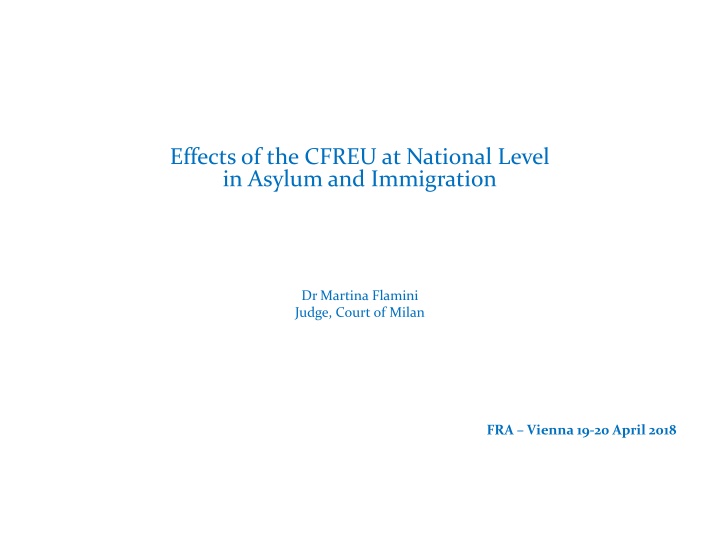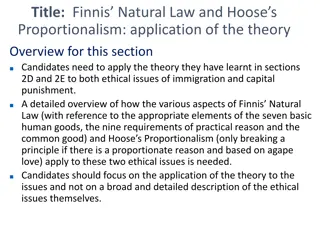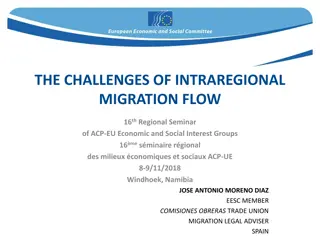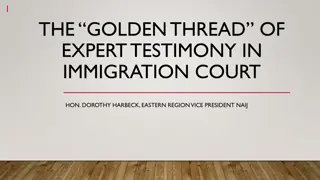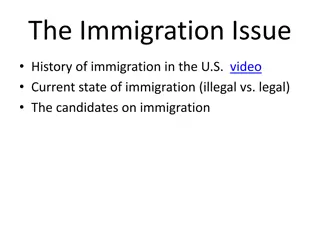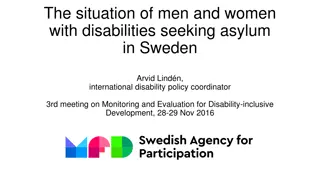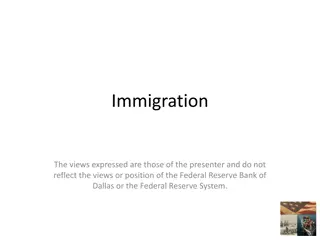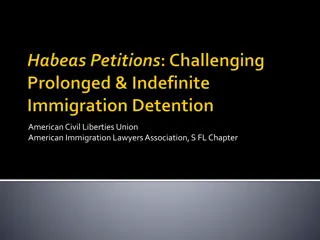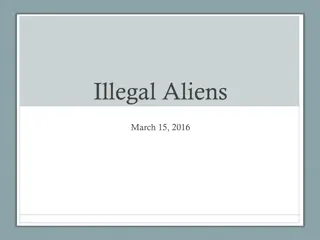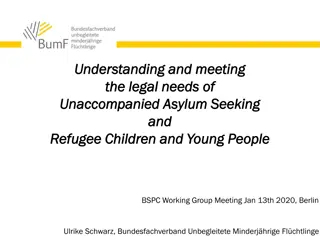Role of the CFREU in National Asylum and Immigration Law: Perspectives from Dr. Martina Flamini
Dr. Martina Flamini, a Judge from the Court of Milan, discusses the effects of the Charter of Fundamental Rights of the European Union (CFREU) at the national level in asylum and immigration cases. The presentation explores the application of the CFREU in national laws, the role of national judges in ensuring fundamental rights, and the influence of CJEU guidance on national procedural rules. Specific emphasis is placed on Article 4 of the CFREU regarding torture and inhumane treatment, illustrated through cases from various national courts.
Download Presentation

Please find below an Image/Link to download the presentation.
The content on the website is provided AS IS for your information and personal use only. It may not be sold, licensed, or shared on other websites without obtaining consent from the author.If you encounter any issues during the download, it is possible that the publisher has removed the file from their server.
You are allowed to download the files provided on this website for personal or commercial use, subject to the condition that they are used lawfully. All files are the property of their respective owners.
The content on the website is provided AS IS for your information and personal use only. It may not be sold, licensed, or shared on other websites without obtaining consent from the author.
E N D
Presentation Transcript
Effects of the CFREU at National Level in Asylum and Immigration Dr Martina Flamini Judge, Court of Milan FRA Vienna 19-20 April 2018
Introduction The case falls within the scope of application the Charter when it concerns: A) national measures that give effect to an obligation contained in a EU law provisionaddressed primarily to thedomestic legislature; B) national procedural provisions that allow for the legal protection, before domestic courts, of the rights conferred on individuals by Union law C) the application of EU law rules, or of the national provisions giving them effect, by a national courtora national administrativeauthority; D) national measures derogating from Union law rules, based on the grounds for derogation explicitly provided by EU primary or secondary law, or based on the ECJ scase law on mandatory requirements; E) national provisions thatclarify notionscontained in EU law measures
The Charter and the role of judge Under the principle of loyal cooperation (art. 4.3 TUE) it is the responsibility of national judges to find the appropriate remedies that ensure fundamental rights. The role of the Charter and CJEU guidance on its interpretation is contributing to the changes of national procedural rules to ensure effective protection of rights. respect of
a) Roleof the charter and substantial rights b) Roleof the charter and procedural rules
Art. 4 charter Article 4 of the Charter contains a single sentence: No one shall be subjected to torture or to inhumane or degrading treatment or punishment . Its wording thus corresponds verbatim to Article Convention on Human Rights (ECHR), entitled Prohibition on Torture. Article 3 ECHR is a non-derogeable right 3 of the European
art. 4 A case of the Czech Constitutional Court which referred to Article 4 Charter and Article 3 ECHR when assessing the conduct of the public authorities handling the return of a third country national. The Court reminded the authorities of the need to respect the rights to human dignity and to be treated in a humane manner when transporting an individual in the context of a non-voluntary return decision, including the need to inform an individual of the time and manner of the return in adequate time. The Irish High Court has made a novel use of the Court of Justice decision in N.S. and others, using the findings in this judgment as support for the credibility of an applicant regarding his travel movements and in particular his account of his period spent in Greece. The finding of the Court of Justice in N.S. and others that there exists a systematic violation of Article 4 Charter in Greece was used to confirm the reasonableness of the applicant s failure not to apply for asylum in Greeceand thereforeaffirm his credibility.
Art. 6 charter - Right to liberty and security One of the most controversial issues in asylum and immigration has been the detention of migrants. These cases raise particular concerns regarding several fundamental rights of the asylum seekers and particular: the protection of the right to liberty and security; access to court and legal aid; effective remedies; claiming the right to asylum, access to social and economic rights, as well as family life and best interests of the child. irregular migrants, in
The fundamental immigration detention are possible as long as these measures respect the safeguards required by Article 52(1) Charter, namely: 1) the limitations must be provided by law; 2) respect the essence of the right; 3) genuinely meet the objectives of general interest; 4) necessity; and 5) proportionality. At national level, the majority of issues concerning asylum and immigration misapplication(s) or a failure to apply the standards already provided for in EU secondary legislation, rather than using Article 6 CHARTER to clarify the standards in EU or national legislation. right to liberty right, and security both is a relative and therefore asylum detention involve
Estonia, Supreme Court, case no 3-3-1-32-15, Judgement of 15 September 2015 The complainant is a citizen of Russian Federation who came to live in Estonia when he was 4 years old. He has served several prison sentences in Estonia. The Police and Border Guard annulled his long-time residence permit and on 18 December 2014 issued him a precept to leave the country. He contested the precept to leave Estonia. The complainant contested the ruling of the Administrative Court and the Circuit Court settled his appeal. According to the ruling of the Circuit Court there was a need to release the complainant because the court had suspended the execution of his precept to leave. Police and Border Guard Board lodged an appeal to the Supreme Court claiming that according to the Directive 2008/115/EC Art. 15(1) the detention of a third-country national who is the subject of return procedures is allowed in order to prepare the return and/or carry out the removal process. The detention of the complainant is necessary because there is a risk of absconding and it is required because of a protection of public order. The Court explained the effect of the suspensive measure applied by the court in the case where the complainant contested the precept to leave. Court did not suspend in that case the validity of the precept but only the execution. It is a temporary measure. The detention is not an inevitable part of the execution of the removal but a measure with the purpose toassure the removal.
ARTICLE 7 Charter Respect for Private and Family Life Article 7 of the Charter contains a right to respect for private and family life, home and communication. Related rights are contained in Article 8 CHARTER (to the protection of personal data), Article 9 CHARTER (the right to marry and found a family), Article 10 CHARTER (freedom of thought, conscience and religion) and Article 24 (rights of the Child). Article 7 Charter is relevant in a number of situations in immigrationand asylum law. The right to a family life and the need to protect the family unit is reflected in many instruments of the immigration and asylum acquis. Including the Family Reunification Directive itself, the Dublin III Regulation, the Qualification Directive, the Reception Condition Directiveand the Returns Directive. Secondly, Article 7 Charter can impose obligations on national authorities in the context of admission and expulsion decisions where the individual concerned or other individuals have formed a family or private life.
art. 7 In relation to many of the cases in this section, particularly those of the Greek and Romanian courts, Article 7 Charter is not mentioned explicitly but rather these courts cite the analogous provision of the ECHR, namely Article 8 ECHR. A majority of these cases tend to deal with classic expulsion situations in which Article 8 ECHR is invoked in order to resist expulsion with the applicant s claiming a possible violation. The cases provide a good range of examples of the application of Article 8 ECHR. The Greek case 1817/2015 demonstrates a classic instance of a settled and secure family life being protected by the use of Article 8 ECHR rights
Art. 10 Article 10 of the Charter refers to the freedom of thought, conscience and religion and corresponds to Article 9 of the European Convention on Human Rights (ECHR). In accordance with Article 52(3) CHARTER, Article 10 CHARTER should therefore have the same scope and meaning of Article 9 ECHR. Religion is one of the grounds of persecution outlined in Article 1A of the Geneva Convention and is one of the relevant reasons for granting refugee status under the Qualification Directive.
Council of State, the Netherlands, judgment of 23 May 2013 The applicant allegedly converted from Islam to Christianity in his country of origin, Iran. The Dutch authorities denied his application for asylum because the conversion was deemed not credible. The Court of First instance annulled the decision, because the authorities had relied too heavily on the applicant s (incomplete or wrong) answers to factual questions about Christianity where these have nothing to do with the faith and inner conviction of the applicant. Since the applicant had explained how and why he converted, how he expresses his faith and did not display a complete lack of knowledge about Christianity, the authorities had given insufficient grounds for denying his application. The authorities the Minister for Immigration and Asylum appealed this decision to the Judicial Division of the Council of State.
The Dutch Council of State had to review whether the conversion to Christianity claimed by the applicant was credible, and whether the administrative authorities erred in their finding a lack of credibility due to incomplete or wrong answers given by the applicant to questions concerning concluded that the authorities correctly took into account that the applicant had converted, which was the result of a conscious and deliberate choice. Also, they did not predominantly base their decision on factual questions, but also on statements regarding the process of conversion. The questions about the applicant s baptism and church visits were in fact not factual questions but related to the conversion, as these elements form an integral part of the conversion by the applicant and the meaning his new faith holds to him. Christianity. The Court
Art. 18 Article 18 of the Charter provides for the right to asylum, which shall be guaranteed with due respect for the rules of the Geneva Convention of 28 July 1951 and the New York Protocol of 31 January 1967 relating to the status of refugees. Within the European and international human rights law, Article 18 CHARTER is unique. Since the Universal Declaration of Human Rights (Article 14 UDHR), the Charter is the first document to contain a separate and express right to asylum. The Geneva Convention recognizes refoulement and implicitly the right to seek asylum but not the right to enjoyasylum. the principle of non-
Italy, Supreme Court of Cassation, judgment of 10 April 2015, file No. 7333/2015 The applicant, a Nigerian national, made an application for subsidiary protection in Italy. In it he alleged a threat to his life as a result of a succession dispute in his extended family following the death of his father that had already claimed the life of his wife. He did not submit any information in relation to the general security situation in Nigeria. He was granted subsidiary protection by the Court of First Instance. This however was reversed on appeal before the Court of Appeal of Bologna. The Court of Appeal found that the applicant had not established a direct link between the presence of high levels of indiscriminate violence in his country of origin and his own particular situation and the threat he faced. Accordingly he did not qualify for subsidiary protection. The applicant appealed this judgment before the Supreme Court of Cassation arguing that the Court of Appeal had rejected his claim based on the fact that he did not submit information regarding the general security in his country of origin and that there was a duty on the national authorities to take such facts into account when assessing an application forsubsidiary protection
In applying these findings to the present case the Supreme Court found that the credibility of the applicant had been established and that taking into account the general security situation in Nigeria, the persistent conflict between tribes and the general lack of control by the authorities, it was clear that the national authorities were not in a position to provide the applicant with adequate security. He would therefore be exposed to a risk of serious harm in the event of removal to Nigeria and therefore should qualify for subsidiary protection
Article 19(1) Prohibition of collective expulsion Article 19 of the Charter provides in its first paragraph a prohibition of collective prohibition is contained in Article 4 of Protocol 4 of the ECHR. The ECtHR has so far developed precise standards that States have to follow in order to avoid violations of this provision. The relation between Article 19 Charter and Article 4 Protocol 4 is very close, the ECtHR referring to the EU Charter in declaring Italy s responsibility for failure to fulfil its international refugee law obligation and highlighted that the non-refoulement principle is also enshrined in Article 19 Charter. According to Article 52(3) Charter, Article 19(1) Charter should be read in light of Article 4 Protocol 4 as interpreted by the ECtHR. expulsion. An equivalent
Article 19(2) principle of non-refoulement Article 19(2) Charter provides that no one may be removed, expelled or extradited to a State where they would be subjected to the death penalty, torture or other inhuman or degrading treatment or punishment. According to the explanations on the Charter, Article 19(2) Charter incorporates the standards developed by the ECtHR underArticle 3 ECHR. The protection against refoulement envisaged in the Charter covers everyone without exception (unlike Article 33 of the Convention related to the Status of Refugees of 1951), and its territorial reach depends only on Article 51 Charter. Personal scope of application is limited to refugees.
Slovenia, Constitutional Court, U-I-189/14, Up-663/14, Judgementof 15 October 2015 Applicant was granted a status of subsidiary protection in Slovenia. Applicant substantiated his claim on the basis of second and third indent of Article 28 of the International Protection Act which include torture or other inhuman or degrading treatment or punishment in the state of origin and serious and individual threat to a civilian's life or person by reason of indiscriminate violence in situations of international or internal armed conflict. In the process for the renewal of the subsidiary protection, applicant again referred to second and third indent of Article 28 of the International Protection Act. The competent organ stated in its decision that its assessment forrenewal was limited to the reasons already put forward in the request for subsidiary protection and denied the renewal of the status. This decision was confirmed by administrative court and supreme court. The Constitutional court found that the process of renewal of subsidiary protection was incompatible with the prohibition of torture as provided for in Article 18 of the Constitution of the Republic of Slovenia, which includes principle of non-refoulement if there exist real danger that in case of return of this person to the country where it came from itwill be subject to inhuman treatment.
b) Roleof the charter and procedural rules Art. 41 Right to good administration in asylum and return procedures. The right to be heard Art. 47 Right to an effective remedy
Art. 41 Article 41 of the Charter guarantees the right to good administration as a fundamental right of every person, whether a citizen of the Union or otherwise. Accordingly, every person falling under the jurisdiction of the EU has the right to have his or her affairs handled impartially, fairly and within a reasonable time by the institutions and bodies of the Union. The right to good administration is an umbrella right including the following guarantees: the right of every person to be heard, before any individual measurewhich would affect him or heradversely is taken; the right of every person to have access to his or her file, while respecting the legitimate interests of confidentiality and of professional and business secrecy; the obligation of the administration to give reasons for its decisions
Art. 41(2) CFR: right to be heard; right to have access to the files; right to have the administrative decision motivated (stated reasons); Art. 41(3)+(4) CFR: specific direct guarantees only for the EU administration; The scope of the general principle of law of good administration > Art. 41 CFR - subjective rights (e.g. broaderduty tocare/diligence);
The right to be heard EU secondary legislationguarantees forright to be heard varies: - Asylum: almost mandatory (Art. 14 Recast APD, with only 2 exceptions) - Additional guarantees of the duty of good administration can be found in Art. 4 Qualification Directive assessment of facts and circumstances: In cooperation with the applicant, it is the duty of the Member State to assess the relevant elements of the application for international protection. (duty to cooperate) - Expulsion procedures (return/removal): no mention of the right to be heard (Art. 12 Return Directive) Varied national practiceson the level of protectionof the right to be heard: - Lack of hearing within each administrative proceedings carried out within connected procedures: - Within separate subsidiary protection (Ireland); - Within combined administrative proceedings (asylum and return; migration + return) with (Belgium, France); - Unclear remedies in cases of violations of the right to be heard: absolute, versus relative nullity (e.g. Netherlands); remedy in the form of a judicial hearing by a courtwithin appellateprocedures (Italy) simultaneous administrative decisions;
Content of the right to be heard in IP proceedings as derived from the EU dutyof cooperation: The interview shall include the opportunity to give an explanation regarding elements which may be missing and/or any inconsistencies or contradictions in theapplicant s statements. Art. 16 Recast APD Inconsistencies between the evidence (story) of the applicant and the COI used by the authorities should be put forward to the applicant to be discussed (ECtHR, J.K. v Sweden, R.F. v Sweden) What theright to be heard does not include, so far: The right to be heard does not imply a right to call and cross-examine witnesses, such a right does not normally constitute part of the right of the defence in the context of administrative procedures. (M.M. (2)); It does not impose a mandatory information of the applicant of the administration s intention to reject the subsidiary protection application or the grounds it intends to base its rejection. (M.M.(1) +(2));
What role for national courts in cases of infringements of the right to be heard? The consequences of violations of the right to be heard in asylum and immigration proceedingsare notexpressly laid down by EU law: Where the conditions under which observance of the third-country nationals right to be heard is to be ensured, and the consequences of the infringement of that right are not laid down by EU law, those conditions and consequences are governed by national law, provided that the principles of equivalence and effectiveness are respected (G&R, C-383/13, PPU) principle of equivalence = rule adopted to give effect to EU norms are the same as those towhich individuals in comparablesituations undernational law are subject principle of effectiveness = the national rules do not make it impossible in practice orexcessivelydifficult toexercise the rights of defenceconferred by the EU legal order Possibleremedies: 1. Relative nullity (G&R, C-383/13, PPU, para. 38): An infringement of the rights of the defence, in particular the right to be heard, results in annulment only if, had it not been for such an irregularity, the outcome of the procedure might have been different. (analogywith remedies in EU competition law) 2. Oral hearing before the court within the appeal proceedings (see C 348/16, Moussa Sacko, when national courts have this power under domestic administrativeprocedure)
Article 47 of the Charter Right to an effective remedy and a fair trial Everyone guaranteed by Union law are violated has the right to an effective remedy before a tribunal in compliance with the provisions of this article. whose rights and freedoms
The use of the Charter and the principle of effective remedy Balancing the rights Administrativedecision and judicial review Burden of proof Ex officio powers and the limits of the claim Creating new remedies on the basis of the principle of proportionality Is the proportionality of remedies and sanctions determinated also in relation to the balancing between conflicting rights?
Court of Milan, 14.7.2017 Mr X, a kurdish citizen from Iraq, appeals against the decision authority to withdraw subsidiary protection The decision is based on the danger for security of the State, suspected of being a member of Foreign Fighter Returneed of administative the status of because he is
a) Balancing the rights The security of the State and the right to be protected from the risk of serious harm The danger to the security provision corresponds to the first exception provided for in Article 33(2) Refugee Convention, which is intended for cases in which it is established that the refugee poses a current or future danger to the host country. The provision aims to protect the State itself; Does the need to protect the community within the state of refuge outweigh the interest of the individual to be protected from persecution? If the right of the asylum seekers has to balanced with security of the State, is the remedy different?
b) Administrative decision and judicial review: the duty of cooperation of the non judicial and judicial authority In cooperation with the applicant, it is the duty of the Member State to assess the relevant elements of the application (art. 4, Directive 95/2011). In this case the authority has to: inform the applicant about his duties, ask clarify what is unclear, inconsistencies, lack of plausibility issues, obtain relevant country of origin information, use language analysis reports and information from other persons, ask information to the administration. the applicant to address sufficient information, apparent
c) Burden of proof 1. Applicant s duty to substantiate (burden of proof for the applicant); 2. Case officer s duty of investigation (burden of investigation for the case officer); 3. Specific substantiation rules (shifted burden of proof). 4. In the field of exclusion clause: any authority which finds that the person concerned has occupied a prominent position within an organization which uses terrorist methods is entitled to presume that that person has individual responsibility for acts committed by that organization during the relevant period.
d) Ex officio powers and the limits of the claim The right to be heard of theasylum seekers The judge consults COI different from the COI used from theadministrative authority The judge asks the Police more information, relating to the document defined secret by theadministrative authority The judge can analyze elements relevant for other forms of protection (different from the protection claimed from theapplicant)
e) Creating new remedies? Article 17 Qualification exception of the prohibition against refoulement in Article 33(2) Refugee Convention. The judge declares the existence of exclusion clause (danger for the security of the State) and recognizes to Mr X the national humanitarian protection) The judge recognizes a form of protection different from the protection asked from the claimant The remedies could be different if the right of the claimant has to balanced with other rights than the securityof State Directive mirrors the protection (called
Conflict with the Charter and the role of national italian judge Based on Article 6(1) TEU, the Charter has the same status of the Treaties . The Court of Justice is the only jurisdiction with competence to hold EU law provisions invalid, in the context of a reference for preliminary ruling (Article 267 TFEU) ora direct action forannulment (Article 263 TFEU). Judges compatibility cannot be achieved through interpretation, they are under a duty to solve the conflict by disapplying the conflicting national provision; however, disapplication requires that the relevant EU law provision4 satisfies the requirements for direct effect. play a particularly important role. When
Italian Constitutional Court, decision 269/2017 The double preliminary ruling (constitutionality and Charter issues): if a law is object of doubt of unlawful with regards the right protected by italian Constitution and the right protected by the Carther, the judge has to hilight the question to the Costitutional Court, without prejudice to chance to raise question fora preliminary ruling The so called "spillover effect? The "without prejudice clause Before to the Constitutional Court or to the Court of Justice?
There is risk in the light of the opinion of Constitutional Court to attract to the Costitutional Court also the matters of direct effect (so the spet back respect to judgment Grantital and Simmenthal).
Judicial implementation of the Charter: ACTIONES DATABASE - ACTIONES MODULES ON THE CHARTER available online. Check: https://www.eui.eu/Projects/CentreForJudicialCooperation Judicial Training Project co-funded by the Justice Programme of the European Commission "Roadmap To European Effective Justice (Re-Jus): Judicial Training Ensuring Effective Redress To Fundamental Rights Violations" (JUST/2015/JTRA/AG/EJTR/8703), University of Trento (Italy) information and materials available at http://www.rejus.eu/ coordinated by the Specific toolsavailable: - Database of the RE-Jus Project on interaction between EU and national caselaw on effective enforcement of fundamental rights, available at http://www.rejus.eu/content/database-index - RE-JUS CASEBOOK on EFFECTIVE JUSTICE IN ASYLUM AND IMMIGRATION (forthcoming at www.rejus.eu)
